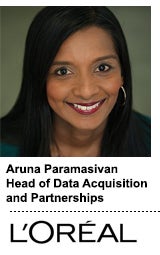Big consumer product brands like L’Oreal have soaked up as much data as possible in recent years as they try to assemble consumer profiles without the direct data enjoyed by ecommerce merchants and retailers. Doing so requires a multifaceted strategy.
L’Oreal’s head of data acquisitions and partnerships, Aruna Paramasivam, described her company’s efforts along these lines at the IAB Data Symposium in New York City on Monday.
According to Paramasivam, brand marketers suffer from a gap in data quality for media activation on one hand and for measurement and attribution on the other.
L’Oreal gathers first-party data from its limited ecommerce sales and augments it with more scaled data from distribution partners like Amazon or Sephora. It uses these data sets to build internal audience segments, and then extends those segments online using lookalike models.
“For activation in programmatic, you want at least a million consumers per segment to find on the open exchange,” she said.
But while data partners have made it easy to activate data in media campaigns, analytics is a different story.
“It’s frustrating for us because the attribution and measurement decisions right now don’t have the granularity and data quality we’d like,” Paramasivam said.The transaction data L’Oreal would prefer to use to determine ROI is often unavailable because retailers won’t share data, or they share some aggregated sales data months after a campaign ends.
Testing new or niche data sources has become a committed practice at L’Oreal, she said. “There’s always something new in this space, so supporting existing campaigns while also staying current in an innovative environment is critical.”
In one case, L’Oreal tested the location data startup Factual to target mobile audiences within a geofenced proximity to a Kiehl’s store, a men’s grooming and skincare brand owned by the company.
“We wanted to split our targets between Kiehl’s shoppers and competitive brand shoppers to see just how much brand loyalty factored into conversions to store foot traffic,” she said. The company uses data vendors like LiveRamp and Facebook to determine if audience targets ended up visiting a store.
AdExchanger Daily
Get our editors’ roundup delivered to your inbox every weekday.
Daily Roundup
Paramasivam has also struck up “second-party” deals to extend L’Oreal’s reach into adjacent categories. Dating services or fitness apps have proven valuable, “non-competing brands where there’s a synergy between customer sets.”
After years spent focused on accumulating data for data’s sake, brands should think harder about quality, according to Paramasivam: “What’s the fidelity of the data signal? How close to the direct consumer and to real time is the data?”
Brands must take responsibility for answering these questions, she said.
“At the brand level, you’re very dependent on your ecosystem and the technology system holding it up.”















